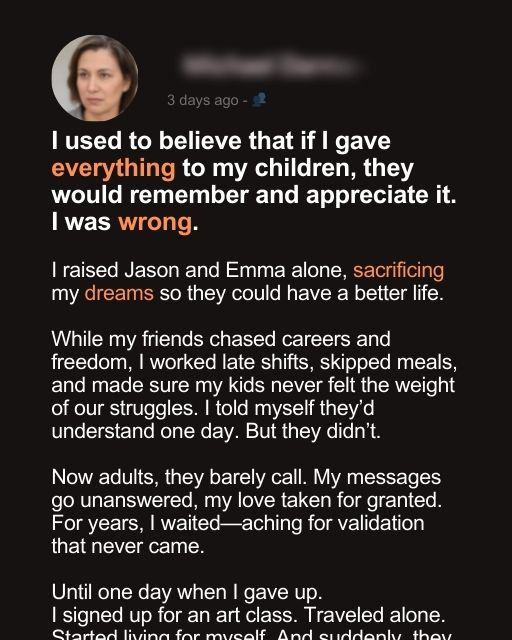I used to believe that love—real, unconditional love—was enough. That if you gave every piece of yourself to someone, they would remember. They would see. They would appreciate.
I was wrong.
I had my first son, Jason, when I was twenty-three. His father and I had grand plans—travel the world, chase careers, live in a high-rise apartment overlooking the city skyline. But when the pregnancy test came back positive, those plans unraveled faster than I could catch them.
He left before Jason turned one. And just like that, it was me and my baby boy against the world.
I won’t lie—it was hard. I traded my ambitions for late-night feedings and diaper changes. While my friends built their careers, I was learning how to soothe a colicky infant. While they were out at parties, I was at home, cutting sandwiches into tiny squares, worrying about the next grocery bill.
Then came Emma, my second child. Another man, another broken promise. But I didn’t mind. I had my kids. They were my purpose.
For years, I worked two jobs, sometimes three, making sure they had everything I never did growing up. I never let them feel the weight of our struggles. I took extra shifts so they could have brand-name shoes. I skipped meals so they could have birthday presents. I told myself that one day, when they were older, they would understand.
But they didn’t.
Jason is twenty-four now, living in another city, too busy to call. Emma is twenty-one, always “too tired” to reply to my messages. They live their lives as if I was just a side character in their story.
When I text them, sometimes they leave me on read. When I call, it goes to voicemail. And when they do answer, their voices are clipped, distracted.
“Hey, Mom. Can’t talk. I’m busy.”
Busy.
Busy with what? With people who haven’t sacrificed for them the way I have? With friends who will move on in a few years? With work, with dates, with things they prioritize over me?
It stings. It burns. And I tell myself not to take it personally, but how can I not?
A few weeks ago, I saw Jason post a picture of himself on social media, out with friends in a restaurant. I commented, just something simple—“Looking good, son!”—and it took him two days to like it. No reply.
Emma posted about getting a new job. I called to congratulate her. She didn’t pick up. Later, I saw she had responded to other people in the comments. I wasn’t worth a call back.
For a long time, I let the hurt build up inside me like a pressure cooker, waiting to explode. But then, last week, something changed.
I was at a café alone, scrolling through my phone, when I saw a mother and daughter at a nearby table. The daughter, maybe seventeen, was glued to her screen while her mother kept trying to start a conversation.
The girl barely responded.
I saw the mother’s face—hopeful, then disappointed, then resigned.
And for the first time, I saw myself from the outside.
I had spent years waiting. Waiting for Jason and Emma to see me. Waiting for them to come back. Waiting for a thank-you I might never get.
And suddenly, I asked myself—what if I stopped waiting?
What if I started living?
That night, I signed up for an art class. I had always loved painting, but I put it aside for work, for responsibilities, for them. Now, I was taking it back.
I booked a weekend trip to the mountains, alone. I sat by a lake and breathed in the crisp air, realizing how long it had been since I did something just for me.
I started saying no—to guilt, to disappointment, to the constant, aching need for validation.
I began saying yes—to new experiences, to laughter, to people who actually wanted to be around me.
And something strange happened.
As I pulled away, my children started noticing.
Jason called one evening, out of the blue.
“Hey, Mom. What’s up?”
I told him about my painting class. He seemed surprised.
“That’s cool,” he said. “You always liked art.”
Emma messaged me after seeing a photo I posted from my trip.
“Looks amazing, Mom! Wish I could’ve joined.”
For the first time in years, the dynamic shifted. I wasn’t just waiting in the background, hoping they’d remember me. I was out there, living. And when they saw that?
They wanted to be a part of it.
Here’s what I’ve learned—love is not about sacrificing yourself to the point where there’s nothing left. Love is about showing up for yourself, too.
So if you’re reading this, and you feel forgotten—if you feel like you gave up your dreams for people who don’t seem to care—remember this: You are still here. You are still worth something. And it’s never too late to start living for yourself.
If this story resonates with you, share your opinion with us.




